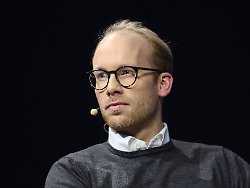Interview with Viessmann boss
“This crisis absorbs me”
By Horst von Buttlar
April 1, 2022, 5:40 p.m
Max Viessmann, head of the heating contractor of the same name, is dealing first with the corona pandemic, then with the stress in the supply chain and now with the war in Ukraine. The Viessmann building in Kyiv was destroyed. In the “Zero Hour” podcast, he tells how the family business has reacted since the outbreak of war.
In the first days of the war, the Viessmann building in Kyiv was also destroyed, the 40 employees of the heating engineer had to flee, and business with Russia was halted. Since then: crisis management, a little bit of emergency every day. “These are moments that you don’t forget,” says company boss Max Viessmann in the podcast “The hour zero.” “That changed me a lot.” As a family business, you are always aware of your responsibility for your employees. “But when you’re listening to the manager who’s sitting in the car with his children on the way out of the bombed city of Kyiv and he fears for his life, that’s a whole different level of responsibility.” The heating and air conditioning company had prepared itself and, among other things, rented a hotel for around 40 employees in the Ukraine. But the outbreak of war came as a shock.
Prior to the attack, Ukraine was a small but growing market for the 105-year-old Allendorf-based company. And it will continue where the war allows. “Business continues from Lemberg,” reported Viessmann. “I can also fully understand that you need a piece of everyday life. What our team is doing under the circumstances is simply unbelievable.”
Like more than 400 other companies, Viessmann has discontinued business with Russia – an issue that Max Viessmann finds quite ambivalent. The employees there are also affected, who did not support the war and suffered greatly from the sanctions because “inflation is going through the roof.” “Food prices have risen by more than 40 percent in the last two weeks – and that with dwindling incomes,” said Viessmann. In the West he sometimes lacks differentiation. As a company, he has a “certain duty of care” to distinguish between “those who caused and triggered this war and those affected”. That doesn’t always have something to do with national borders. “I still have responsibility for these people.”
“I’m in shock”
For Max Viessmann, who moved into company management in 2017 and has been at the helm since the end of 2021 at the age of just 32, the war is a formative experience: “The crisis is absorbing me as an entrepreneur in all its facets.” First he had to manage the Covid crisis, then the massive problems in the supply chains – now you would “slip into” a geopolitical conflict. “You ask yourself what else you can expect of your organization.” But the war comes first, of course. “As a citizen and less as an entrepreneur, I am in shock at the brutality we are seeing in Ukraine.”
The energy crisis is leading to discussions about how quickly Germany can replace millions of old heating systems – especially since gas heating systems are to be replaced alongside oil-fired boilers. Max Viessmann recommends using heat pumps in new buildings, in combination with photovoltaics and an electricity storage system. With existing buildings, things are more complicated – because 85 percent have not been renovated and only a good one percent is renewed each year. The future lies in “hybrid solutions”: high-temperature heat pumps, photovoltaics, perhaps biomass and gas for cold phases in winter and peak loads when electricity is scarce. As a user, you need a “best of all worlds”. Above all, solar thermal energy, which has been overshadowed by photovoltaics for years, is an important building block. Which of course is also a question of costs – the installation of heat pumps is much more expensive than, for example, a gas boiler.
“The biggest challenge is the decarbonization of cities,” says Viessmann, especially apartment buildings from the pre-war period required new, above all digitally controlled combinations of district heating, geothermal energy and so-called booster heat pumps. “The most important thing for all of us will be that we pragmatically do everything we can to solve these things and not die perfect,” says Viessmann. The federal government should include the manufacturers in the discussion so that a “reasonable timetable” is obtained. “We can help ensure independence from Russian gas and still achieve climate protection goals.”
Listen in the new episode of “The Zero Hour” in addition
- A Interview with Alexander Rodnyanskythe economic adviser to the Ukrainian President Volodymyr Zelensky
- An update like that Exchanges on the gas contingency plan react – have they really digested the shock?
All episodes can be found directly at AudioNow, Apple or Spotify or via Google.
